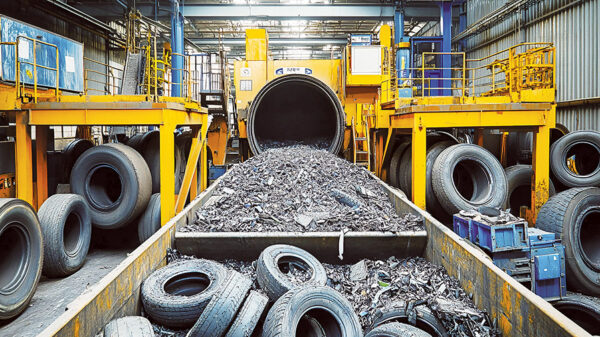by MAURA KELLER
As more and more cities are starting to ban the use of plastic bags at stores, the recycling industry is setting its sights on transforming plastics into alternative energy and fuel.
What has been the evolution of converting post-use non-recycled plastics into diesel fuel in the U.S.? And how has this process been impacted by plastic recycling activities in the U.S.?
According to Dr. Thathiana Benavides, assistant energy systems analyst at Argonne National Laboratory, the need to divert valuable material like plastic from landfills has driven the industry to look for alternatives that are economical and environmental friendly.
“Recycling rates have been increasing in the last few decades,” Benavides said. “But there are plastics that are not easy or economically feasible to recycle. Conversion technologies can be applied to transform non-recycled plastic into a valuable commodity while reducing landfill space usage, in addition to creating a reliable source of alternative energy from an abundant, no-cost feedstock.”
|
Plastics to fuel (PTF) can convert any type plastic into fuel, but industries are focusing more on waste plastic that cannot be recycled. PTF is the transformation of plastic – or plastic waste – into ultra-low sulfur diesel (ULSD) fuel. In this process, non-recycled plastics (NRP) are heated to approximately 430 to 550°C in the absence of oxygen. During pyrolysis, gas, liquid fuel, and char form in proportions that depend on the pyrolysis system and the composition of the plastic feedstock.
Different technologies for the conversion process, such as pyrolysis and gasification, may be used but the most popular and simplest is pyrolysis. Pyrolysis uses high temperatures (in the absence of oxygen) to break down the large molecules. As a result there is gas, liquid fuel and char produced.
As Benavides explained, a large fraction of plastic in municipal solid waste (MSW) is not recycled in commercial markets due to contamination, logistics and limited markets. “I don’t think that PTF competes with recycling activities. A good example is Polyethylene terephthalate (PET),” Benavides said. “This plastic resin has the largest recycled rates and based on the result of the survey we conducted, companies did not use it in their PTF technology. So I don’t think that PTF technology will impact – in a negative way – plastic recycling activities.”
Jennifer Dunn is a chemical engineer examining the cradle-to-grave energy and environmental implications of the production and use of transportation fuels and technologies at Argonne National Laboratory. She leads the biofuels life cycle analysis team and examines the life cycle impacts of automotive lithium ion batteries. Dunn identifies the key factors driving environmental effects, such as greenhouse gas emissions, of these technologies. She then identifies possible burden shifting of environmental effects from one life cycle phase to another. Much of Dunn’s work is incorporated into Argonne’s Greenhouse Gases, Regulated Emissions, and Energy Use in Transportation model, which has more than 20,000 users worldwide.
“There has been a concerted effort to develop PTF technology in the U.S., Dunn said. “The first commercial scale plant for converting waste plastic to fuels is slated to open in Indiana and BP is planning to purchase the products.
Specifically, Brightmark Energy, a San Francisco based renewable energy development company that develops, owns and operates waste and energy projects, has acquired a majority interest and invested $10 million in a groundbreaking plastics-to-fuel technology company, RES Polyflow in Chagrin Falls, Ohio. Brightmark Energy’s project employs technology solutions including combined heat and power, biogas and waste-to-energy that are tailored to customer needs.
RES Polyflow’s patented plastics-to-fuel process complements current recycling efforts by converting low-value, co-mingled plastic waste, such as film and flexible packaging, into marketable petroleum blend stocks like fuels and wax.
According to Brightmark Energy, “This sustainable technology directly addresses an acute problem facing the U.S.: More than 91 percent of the 34.5 million tons of plastic domestically produced each year is not recycled. These products end up sitting in landfills for thousands of years or littering communities and waterways. We’re excited to help bring an economically viable solution to the marketplace.” The good news? RES Polyflow designs, manufactures and implements commercial-scale energy recovery systems that offer a responsible end-of-life solution for non-recycled waste plastic.
The RES Polyflow plastics-to-fuel process allows post-use plastics to be utilized in an environmentally friendly way, offering a productive end-of-life solution for this material.
Located in Ashley, Indiana, the new facility will convert 100,000 tons of plastic waste into 18 million gallons of ultra-low sulfur diesel fuel and naphtha blend stocks and 5 million gallons of wax per year.
Benavides doubts the ban on plastic bags will affect PTF technology because other sources of plastic waste are available. “Based on the survey we conducted, most of the companies get plastic waste from industrial sources, agriculture plastic waste, and electronic industries,” Benavides said. “The role of the recycling industry is very important. It can be a source of waste plastic that instead of ending up in the landfill, will be used to produce fuel and displace fossil fuel.”
To further enhance the role of PTF as it relates to plastics recycling, companies are trying to use the technology of pyrolysis of plastic to produce products like petroleum-based products rather than fuel because of the economic value of products.
“Lubricants are a good example,” Benavides said. “This technology can be used to produce lubricants which has higher economic value than fuel.”
Argonne’s analysis shows that PTF holds promise to produce ultra-low sulfur diesel fuel as a good waste management strategy. “The diesel fuel is as GHG intensive as conventional ultra-low sulfur diesel and likely less water-intensive,” Dunn said. “PTF could serve as a promising complement to recycling in management of plastic waste and a viable alternative to landfilling.”
Published in the February 2019 Edition






